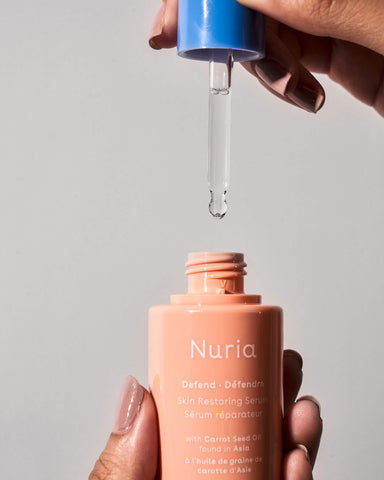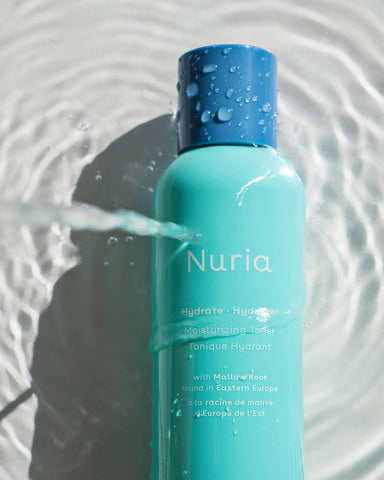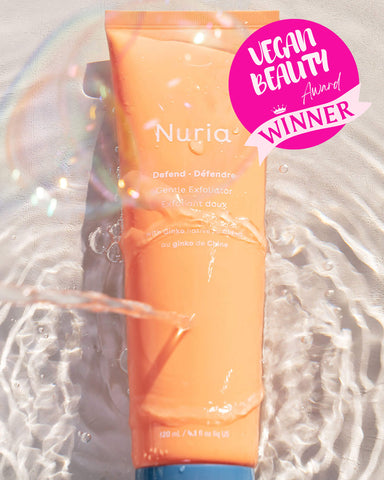
How to Help a Damaged Skin Barrier
You wake up and look in the mirror, and you see you’re breaking out. Ack! After a long deep sigh, you attribute it to stress, the chocolate cake you had last week for dessert, or even your dirty cell phone.
And in those times when your skin is dry, you figure the weather or hot showers might be playing a role. Throughout our lives, we face different skin issues, and the common underlying factor is the health of our skin barrier. Yes, your skin barrier.
So, what's a skin barrier anyway?
You might recall from school that your skin has three main layers: the epidermis, dermis, and hypodermis. The term “skin barrier” refers to the outermost layer of the epidermis, which helps protect your skin from harsh irritants and holds in moisture, preventing dry skin. It is sometimes called the moisture barrier or permeability barrier.
This important outer layer also acts as a protective shield against harmful microorganisms, helps sustain your skin’s immunity, and regulates inflammation. As you can see, your skin barrier does a lot for you! When you have a healthy skin barrier, your complexion appears smooth, clear, even toned, and balanced.
Conversely, when you have a compromised skin barrier, you’ll experience breakouts, dryness, tightness, redness, irritation, rashes, burning sensations, broken capillaries, and other symptoms that are typically attributed to having sensitive skin. This is because skin barrier damage results in a loss of moisture and nutrients, causing it to appear dry and blemished.
When irritants penetrate your skin directly, they can weaken the strength of your skin, further preventing it from absorbing the nutrients it needs. When this happens, it’s time to begin focusing on the skin barrier with lifestyle changes and a skin care routine that helps strengthen the skin's surface layer and make it more resilient. Then you can be on your way to healthier-looking, brighter skin.
How does your skin barrier get damaged?
Truly sensitive skin (e.g. conditions like rosacea, psoriasis, and eczema) is inherited. Most of us experience unpleasant or uncomfortable symptoms because of a damaged skin barrier. The top factors are:
Age. As you get older, your skin barrier function naturally weakens.
Emotional Stress. Mental stress caused by exams, work, relationship issues, and other life experiences.
Physical Stress. Not getting enough sleep or being dehydrated, etc.
Sun damage. As we have mentioned in previous posts, the sun can do a number on your skin and is a major skin stressor. The best anti-aging product is a sunscreen that you use every day!
Pollution. Air pollution and dust, toxins in air or water, fumes from furniture or carpets, etc.
Environmental Stress. Weather changes or environments that lead to overheating or overcooling.
Over-exfoliation. Although exfoliation can be a great way to keep skin fresh and smooth, it can be harmful when overdone. Too much or too frequent exfoliation can disrupt and damage the skin barrier. Normal skin does not need to be exfoliated more than 3x a week. We know that one is hard to hear because who doesn’t love to exfoliate? Trust us, 3x a week is enough.
Excessive Cleansing. Likewise, over-cleansing can strip the natural moisture from the skin barrier, especially if you use harsh bar soaps or wash with too-hot water.
Consuming dehydrating beverages. Alcohol and caffeine can dehydrate skin and even dilate capillaries, which can make skin red or inflamed.
Smoking. Like pollution, smoking causes oxidative stress, leads to dehydrated skin, and decreases collagen production and cell metabolism.
Diet. A consistently poor diet can result in changes in your skin's appearance. Low-fat diets and spicy foods have also been linked to weakening the skin barrier.
What can I do to help my skin barrier?
If you’re experiencing skin issues, you can benefit from taking steps to restore balance to your skin's protective barrier. Here are some suggestions for how to do that:
Keep your skin hydrated. Hydration is critical for keeping your skin barrier healthy. Try one of our treatment products such our Hydrate Moisturizing Replenishing Serum, Defend Skin Restoring Serum, or Defend Skin Shielding Essence.
Gentle Cleansing. Wash your face no more than twice a day and use lukewarm water. Do not use hot water. Follow with a moisturizing toner to lock in hydration.
Limit exfoliation to once or twice a week with a gentle product before increasing frequency. Our Defend Gentle Exfoliator is designed to be kind to your skin while still giving you that smooth, clear skin feeling.
Wear Sunscreen. Always protect your skin from damaging UV rays with a broad-spectrum sunscreen.
Make lifestyle changes. Minimize or eliminate smoking and alcohol consumption. If you need caffeine in the mornings, drink a glass of water after your tea or coffee to replenish skin hydration.
Feed your skin. Incorporate foods known to help increase moisture in skin, such as celery, cucumbers, walnuts, and green juice. Essential fatty acids, found in avocados, salmon and flax seeds, are also beneficial for skin health.
The Results Will Be Worth It
You will be amazed by the difference a healthy skin barrier can make for having glowing, radiant skin. Basically, whenever you experience a skin issue, there is a good chance your skin barrier is not happy or healthy.
If you can focus on nurturing your skin barrier, you will be thrilled with the results.
About the author, Jasmin Figueroa
Jasmin is an accomplished formulation scientist and skin health expert who has spent her career listening to consumers and developing products that rock. A founding member of the Nuria community, she loves traveling with her family, chilling with her friends at the beach, and will totally judge you if you don’t wear SPF.




